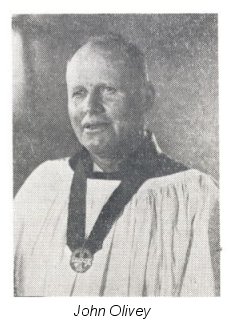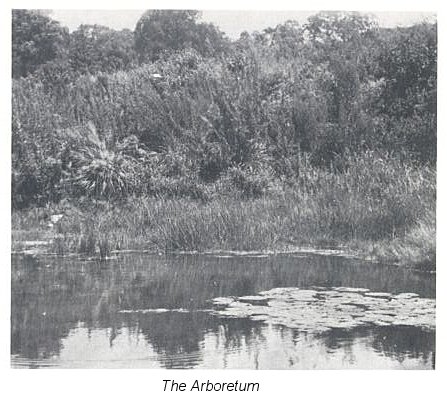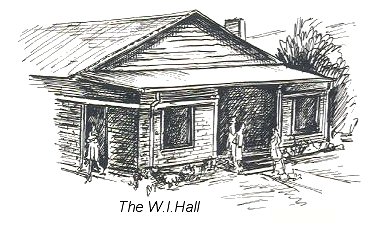 In 1953 the Bethlehemite Fathers of Gwelo bought
Willow Grove from Harris McLeod and started a Mission, using the old farmhouse
as the Mission Station. In 1957 it was taken over by the Carmelite Fathers of
the Diocese of Umtali who continued the missionary work. In 1961 St. Charles
Lwanga Seminary was built, and since then the Church has been built and the
Seminary buildings expanded. It is a Minor Diocesan Seminary and aims to educate
and provide for African boys who wish to become priests. The students, who vary
in number from 50 to 60, remain at St. Charles for four years, and when they
have sat G.C.E. �0� Level they are promoted to the Major Seminary at
Chishawasha. All the students do not persevere, and an average of 20% go through
to the Major Seminary.
In 1953 the Bethlehemite Fathers of Gwelo bought
Willow Grove from Harris McLeod and started a Mission, using the old farmhouse
as the Mission Station. In 1957 it was taken over by the Carmelite Fathers of
the Diocese of Umtali who continued the missionary work. In 1961 St. Charles
Lwanga Seminary was built, and since then the Church has been built and the
Seminary buildings expanded. It is a Minor Diocesan Seminary and aims to educate
and provide for African boys who wish to become priests. The students, who vary
in number from 50 to 60, remain at St. Charles for four years, and when they
have sat G.C.E. �0� Level they are promoted to the Major Seminary at
Chishawasha. All the students do not persevere, and an average of 20% go through
to the Major Seminary.
In 1953 Paddy Crook, Conex Officer, suggested the establishment of an
Arboretum in Melsetter, where it would be difficult to equal the setting and
where conditions favoured the growth of trees. After full discussion the
Horticultural Society decided to go ahead with the scheme, and the lease of 31
acres was accepted from the Government. By 1957 �964 had been collected or
promised and some future annual donations were promised. Fund-raising efforts
continued and the rough plan was laid out.

Attention was once drawn to a travelling difficulty when the question
was asked: �Why does the W. I. top table always have dirty feet?�
With horror the chairman looked at her own feet and those of the Secretary and
Treasurer: those sandal-clad feet were all dirty. It was a dusty, hot time of
year, these members lived about 20 miles out, had farmer-husbands who did the
driving, and had to open all those dreary gates themselves. Nobody has devised a
scheme for not getting hands and feet dusty or, as the case may be, muddy, when
struggling with a concertina gate. And when one arrived in the village there was
nowhere to wash except at the hotel, and if one took time to wash one�s feet
there, the chances were that one was abandoned by an impatient husband, and had
to walk through yet more dust in the streets to the meeting-place.
Other
difficulties were described in 1953: �For many of us,
attending meetings is never a simple matter, but last wet season I undertook my
most complicated trip yet. I was looking after six children, ranging in age from
one to six, only one of whom was mine. If the meeting had been an ordinary one I
might have decided to stay quietly at home, but the two previous meetings had
been cancelled because of the weather and the state of the roads, and I had not
been off the farm for a month and was determined to have an outing.
�I brooded over our short-wheel base Land Rover to see if it would be
possible to transport my temporary family the 25 miles to Melsetter, and then
diffidently told my husband that if he could move the spare wheel from inside
and put it on the bonnet I thought we could all fit in. His reply was not wildly
encouraging but late on Friday evening the wheel was moved. When I also asked
meekly if the door on my side could be put in place, I was informed that I was
quite mad to attempt the trip and that he was going to have a dreadful journey.
I checked the children�s clothes for the next day. Margaret and Jill would have
put on their party dresses if I had not firmly put them put of sight; David and
Gavin could not have cared less if they had gone in yesterday�s dirty shirts and
shorts. I packed a suitcase with a mackintosh and a jersey for everyone, and
prepared food, drink and all utensils for lunches and teas.
�Early on Saturday into the Land Rover went first my attache case with
W.I. papers, then the suitcase of mackintoshes, with Elizabeth�s pram on top of
them filled with all the picnic basket and her own suitcase of necessaries. As
the pram took up nearly all the floorspace, it was lucky that the feet still to
be fitted in were small. Cushions for those incredibly uncomfortable back seats
were put in. We packed Jill and Noelle on one side, and David, Margaret and the
nursegirl on the other. Pat drove, Gavin was between us, and Elizabeth on my
lap. I found my arm had lost its cunning in holding the weight of a baby on a
long trip, and in a Land Rover (even with the door fixed on a few moments before
our departure) there is nowhere to rest an arm, but Elizabeth went to sleep
immediately we set off soon after eight o�clock. The other five children never
stopped talking all the hour and a half it took us to reach the village.
�In Melsetter Pat departed on farmer�s business, and I unpacked, washed
and settled my family on the back verandah of an absent friend�s house, which
had all the necessary facilities. I then blithely took the chair at the W.I.
meeting, �cool, calm and collected�, with no hint of external responsibilities.
Guiding the meeting through three months� accumulated business, with our
secretary absent, took my full attention, and when the last subject was dealt
with I was amazed that two hours had slipped by without my giving more than a
passing thought to my brood.
�At lunch under the gum trees, with more of our family down from the
School and other friends, we were five adults and sixteen children. Then we
parked the children again, and went to �enjoy� ourselves at a political meeting.
Promptly at four I left, unpacked the general untidiness that had accumulated in
the Land Rover, repacked according to the morning�s routine, settled the
children in, and collected Pat.
�On the drive home in a short while Noelle was fast asleep lying back
on the cavas side, her little face gathering more streaks of dust as the journey
continued. Jill and Margaret then fell asleep, while David and Gavin kept awake
without any sign of over-tiredness. Elizabeth, who had slept in her pram in the
afternoon, was full of bounce and tried to dance over me all the way home. So
ended a worthwhile though somewhat harassing day. Within an hour the children
were all bathed, fed and asleep, and peace reigned in the house.�
The W.I. felt the need for its own premises which would, it was hoped,
be of value to Melsetter as well as to its members. The Building Fund was
started with �13.10 from a Bring & Buy Sale and more money was
gradually raised through strenuous efforts. After prolonged negotiations Stand
170 in Heyns Street was bought from Lonrho in 1953 for �80 plus transfer fees,
and it was decided to build each stage as and when there was enough money. In
1956, with over �1 000 in hand, the building was started, and in October 1957
the first meeting was held under the W.I.�s own roof in the finished Committee
room.
With steady progress in raising money and steady work on the finishing
details, the Hall was completed, furnished and fully paid for by Jun, 1961, and
was insured with contents for �4000. Use has been made of the hall for many
social occasions and meetings, and many visitors as well as W.I. members and
their families have gratefully made use of the camping facilities available in
the fully equipped Hall. In 1954 the W.I. celebrated its tenth birthday with a
popular and amusing Book Tea for members and friends.

In 1954 Rathmore Farms and Investments (Pvt.) Ltd, jointly owned by
three Plunket brothers, bought land mainly in the Zunguni valley for
afforestation, as they felt that the tremendous potential of Rhodesia as part of
a multi-racial Federation was attractive for long-term investment; the fact that
the part of the country most suitable for forestry was also one of the most
beautiful was a fortunate coincidence. The company increased its holding to 3
500 acres, and interest in cattle and fruit-growing developed
subsequently.
The farms were mostly undeveloped, and Belmont had been kept as a wild
life sanctuary since 1937 by Major Saunders, who was a keen ornithologist and
established small plantations round the house for the sake of the birds. On the
boundary with Greenmount is a stretch of indigenous primeval forest. Shaun
Plunket initiated development of the estate, and in 1957 Robin and his wife
Jennifer (a grand-daughter of D�Urban Barry an 1890 Rhodesian pioneer) made
their home on Rathmore, which is a family name. The situation of the original
Kok house on Belmont lent itself to development. Extensions have been made to
the house, in which a collection of modern African soapstone carvings blends
well with the 18th century furniture, and the garden has been delightfully laid
out.
By 1954 the Library was on a sound footing and a wide interest was
taken in the flourishing enterprise, and the W.I. was delighted to be relieved
of the responsibility when it was handed over to the representative Board of
Trustees of the Memorial Hall, who appointed a Library Sub-Committee.
In 1956 Mr. and Mrs. Verne Reeves of Rusitu Mission contracted
poliomyclitis; theirs were the only cases in the district and they both made an
excellent recovery, but their illness caused much anxiety. The Biriiri Mission
was started by Mr. and Mrs. Merritt and Iva Mae O�Brient as an educational
centre with classes to Form IV, and the work has since expanded into an African
Teacher Training College.
The Melsetter W.I. Homecraft Club was started, which functions under
the guidance of W.I. members and is financially self-supporting and does a
valuable service in teaching its African members domestic economy, hygiene,
budgetting, and how to run their meetings. Some Club members have attended
external leadership courses, and net-ball is a favourite relaxation. Other clubs
in the district are also run by W.I. members.
Rabies caused considerable anxiety for some months; some people were
bitten and had to undergo the very painful series of injections, and great care
had to be exercised in all contacts with animals.
In 1957 the direct road to the Waterfall was widened for two-way
traffic, and in 1958 the Road Council did a good job repairing and gravelling
the village streets, but any improvement to unsealed roads can only be temporary
and the streets continue to be a problem.
In 1959 Harris and Olive McLeod joined Braam Olwage in building what
was intended as a butchery, but soon afterwards Olwage gave up his interest and
the McLeods started the Pork Pie Cafe.
~~~000~~~